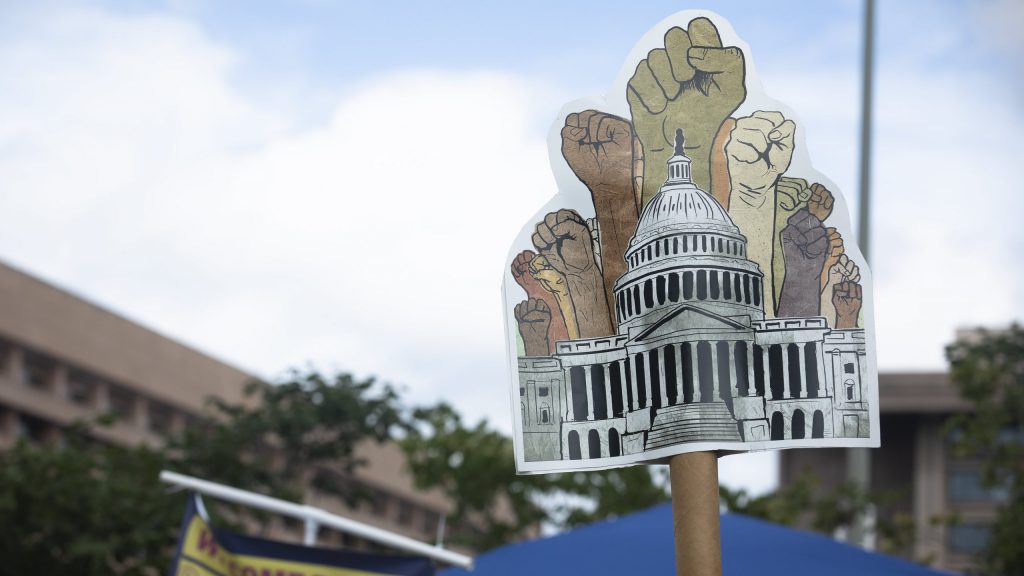Since immigration reform is hard to come by, sometimes the best way to get policy made is by going local -- or by going to court.
Kevin Madden likes the local approach.
He's executive vice president for advocacy at Arnold Ventures and formerly a senior strategist for numerous Republican presidential and congressional campaigns.
"Personalization and localization of the issue matters," Madden, himself the son of immigrants, said at a Sept. 27 forum during the Catholic Legal Immigration Network's 18th annual law and policy conference.
It takes locals to talk about one person who was deported, according to Madden: "Oh, he was great! We liked HIM." He added it's those local links that aid in "putting together a national campaign that's ultimately successful."
Michelle Hackman, who covers immigration issues for The Wall Street Journal cautioned against putting too much stock in local incidents. "It's purely a federal policy," she said. There may be "a lot of protests of ICE detention centers, and sanctuary law, but it's quite limited," she added.
Anthony Romero, executive director of the American Civil Liberties Union, likes the lawsuit route. "It reminds me why we have to sue them -- to keep them honest and keep them accountable," he said.
"Litigation is as important to holding the feet to the fire of our allies as it is fighting the foes of civil liberties and civil rights. That is what creates the political will," Romero added.
"Every single major social issue I care about gets decided in a lawsuit," he said. "You can't forsake the court system."
Romero cited a case the ACLU filed over the Trump administration policy on immigrant family separation in California hoping to get a sympathetic judge, but drew a Republican-appointed judge instead.
"He was slow. He wasn't granting the remedies we wanted," Romero said, "until we began to hit the play button on public advocacy and so the crescendo hit on family separation. ... He got more religious than the people in holding the feet to the fire on Trump and (Trump senior adviser Stephen) Miller. That's where we excel. We also are clear-eyed when we wake up in the morning knowing what we're up against."
The Biden administration is still trying to define its own stance on immigration, according to Hackman.
"You have an administration with a lot of policy advisers who disagree quite fundamentally with each other," she said.
The administration was worried about a surge of immigrants at the U.S.-Mexico border once Biden took office but was "not fully prepared for what was to happen," Hackman added.
Getting new laws made is another matter. "It has become a totally cultural issue. Politicians are even afraid to even support it because they'll get the microphone in front of his face," Hackman said.
Madden said immigration is played "between the 45-yard lines of American politics" with little movement among the American public. It's a different scenario on the GOP primary circuit, though, he added.
"You would get polite applause for tax cuts, growing the economy, other flash points. But when you talk tough on immigration, you would have people leaping to their feet," Madden said. "The consultant cartel is very important in American politics."
He said, "Politics has always been about very vocal minorities or very vocal factions within the electorate. They have a way holding issues like this hostage," adding that he expects Trump to run for the presidency again in 2024 -- but win or lose, the stalemate on immigration will continue for another 10 to 15 years.
"I don't get invited to many parties anymore because I have such a clear view of this," Madden said. "But it's rooted in facts and polling and reality."
Panelist Mark Hugo Lopez, director of race and ethnicity research at the Pew Research Center, broke down some numbers from the 2020 census that indicated the change in the U.S. population wrought by immigration.
"Asians and Hispanics have accounted for 34% of the national population growing since 2000," Lopez said, adding that 55 million migrants have arrived in the United States since the 1960s.
"Many Americans have changed their opinions of immigrants: Immigration strengthens the country because of the talents they bring," Lopez said. "It's striking that nationally we see Democrats and Republicans seeing immigrants are good for the country."

